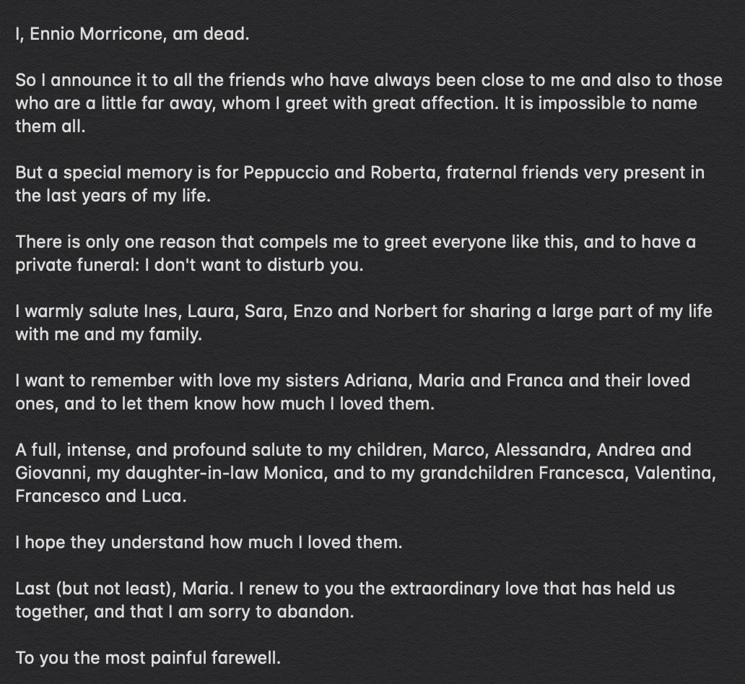Ennio Morricone has died. The beloved film soundtrack composer passed away following complications from a fall that had resulted in a broken femur. He died Monday morning in Rome at the age of 91.
Throughout his life, Morricone scored upwards of 500 films, as well as contributed to a multitude of library productions. He was integral in shaping the sound of the "Spaghetti Western," soundtracking films like Clint Eastwood's A Fistful of Dollars (1964), For a Few Dollars More (1965) and The Good, the Bad and the Ugly (1966).
The Good, the Bad and the Ugly was particularly successful for Morricone and his longtime collaborator, director Sergio Leone, and they had success again soon after with Once Upon a Time in the West (1968), which is one of the best-selling original scores in the world.
From there, the highs of Morricone's career are almost impossible to track but include collaborations with the likes of Gillo Pontecorvo (The Battle of Algiers, 1966), Don Siegel (Two Mules for Sister Sara, 1970), Bernardo Bertolucci (1900, 1976), John Boorman (Exorcist II: The Heretic, 1977), Edouard Molinaro (La Cage aux Folles, 1978), John Carpenter (The Thing, 1982), William Friedkin (Rampage, 1987), Brian De Palma (The Untouchables, 1987), Pedro Almodovar (Tie Me Up! Tie Me Down!, 1989), Franco Zeffirelli (Hamlet, 1990), Wolfgang Petersen (In the Line of Fire, 1993), Mike Nichols (Wolf, 1994) and Warren Beatty (Bulworth, 1998).
Quentin Tarantino used a handful of Morricone compositions in his Kill Bill films, as well as Django Unchained and Inglorious Basterds. The pair then collaborated on the soundtrack for The Hateful Eight — the film that finally gave Morricone an Academy Award for Best Original Score in 2016 after being nominated previously multiple times.
In addition to spearheading the Spaghetti Western sound, Morricone was pivotal in laying the groundwork for the Giallo film movement. Via films such as Dario Argento's 1970 classic The Bird with the Crystal Plumage, Morricone helped define a genre that balanced sweet pop textures with ones of a much more experimental nature.
In fact, those two sides of the musical coin were very much part of Morricone's identity. After training as a trumpeter at a young age, the composer got his start in music by writing pop songs for a variety of Italian singers in the early '60s. Then, in the midst of his rising film career, Morricone would go on to lead Italy's experimental music scene via the legendary collective Gruppo di Improvvisazione di Nuova Consonanza.
Upon his death, Morricone's lawyer Giorgio Assumma handed reporters a self-obituary written by Morricone himself. "I, Ennio Morricone, am dead," it opened.
The one-page text also saw the composer thank his friends and family for their love, addressing his children and grandchildren, as he said, "I hope they understand how much I loved them."
The message added, "I am announcing it this way to all my close friends and even to those who have been a bit distant, I say goodbye with much love. It is impossible to name you all."
He said the "most painful goodbye" was for his wife Maria Travia. The couple married in 1956, and in the letter he said, "to her I renew the extraordinary love that bound us together and that I am sorry to abandon our love. The most painful farewell is to you."
You can read his full letter below.
For a better understanding of the artist's vast and prolific discography, read Exclaim!'s Essential Guide to Ennio Morricone.

Throughout his life, Morricone scored upwards of 500 films, as well as contributed to a multitude of library productions. He was integral in shaping the sound of the "Spaghetti Western," soundtracking films like Clint Eastwood's A Fistful of Dollars (1964), For a Few Dollars More (1965) and The Good, the Bad and the Ugly (1966).
The Good, the Bad and the Ugly was particularly successful for Morricone and his longtime collaborator, director Sergio Leone, and they had success again soon after with Once Upon a Time in the West (1968), which is one of the best-selling original scores in the world.
From there, the highs of Morricone's career are almost impossible to track but include collaborations with the likes of Gillo Pontecorvo (The Battle of Algiers, 1966), Don Siegel (Two Mules for Sister Sara, 1970), Bernardo Bertolucci (1900, 1976), John Boorman (Exorcist II: The Heretic, 1977), Edouard Molinaro (La Cage aux Folles, 1978), John Carpenter (The Thing, 1982), William Friedkin (Rampage, 1987), Brian De Palma (The Untouchables, 1987), Pedro Almodovar (Tie Me Up! Tie Me Down!, 1989), Franco Zeffirelli (Hamlet, 1990), Wolfgang Petersen (In the Line of Fire, 1993), Mike Nichols (Wolf, 1994) and Warren Beatty (Bulworth, 1998).
Quentin Tarantino used a handful of Morricone compositions in his Kill Bill films, as well as Django Unchained and Inglorious Basterds. The pair then collaborated on the soundtrack for The Hateful Eight — the film that finally gave Morricone an Academy Award for Best Original Score in 2016 after being nominated previously multiple times.
In addition to spearheading the Spaghetti Western sound, Morricone was pivotal in laying the groundwork for the Giallo film movement. Via films such as Dario Argento's 1970 classic The Bird with the Crystal Plumage, Morricone helped define a genre that balanced sweet pop textures with ones of a much more experimental nature.
In fact, those two sides of the musical coin were very much part of Morricone's identity. After training as a trumpeter at a young age, the composer got his start in music by writing pop songs for a variety of Italian singers in the early '60s. Then, in the midst of his rising film career, Morricone would go on to lead Italy's experimental music scene via the legendary collective Gruppo di Improvvisazione di Nuova Consonanza.
Upon his death, Morricone's lawyer Giorgio Assumma handed reporters a self-obituary written by Morricone himself. "I, Ennio Morricone, am dead," it opened.
The one-page text also saw the composer thank his friends and family for their love, addressing his children and grandchildren, as he said, "I hope they understand how much I loved them."
The message added, "I am announcing it this way to all my close friends and even to those who have been a bit distant, I say goodbye with much love. It is impossible to name you all."
He said the "most painful goodbye" was for his wife Maria Travia. The couple married in 1956, and in the letter he said, "to her I renew the extraordinary love that bound us together and that I am sorry to abandon our love. The most painful farewell is to you."
You can read his full letter below.
For a better understanding of the artist's vast and prolific discography, read Exclaim!'s Essential Guide to Ennio Morricone.




